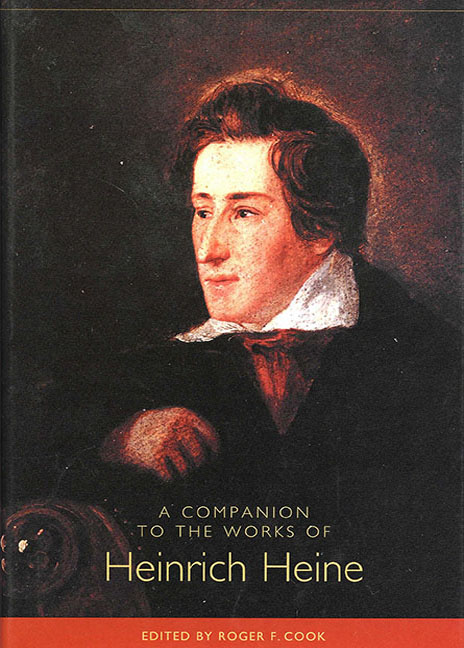Book contents
- Frontmatter
- Contents
- Acknowledgments
- Chronology of Heine's Life
- Heine's Major Works
- List of Abbreviations
- Introduction
- The Romantic Poet
- Philosophy, History, Mythology
- Religion, Assimilation, and Jewish Culture
- Troubled Apostate: Heine's Conversion and Its Consequences
- Heine and Jewish Culture: The Poetics of Appropriation
- Modernity: Views from the Poet's Crypt
- Reception in Germany
- Notes on the Contributors
- Index
Troubled Apostate: Heine's Conversion and Its Consequences
from Religion, Assimilation, and Jewish Culture
Published online by Cambridge University Press: 29 July 2017
- Frontmatter
- Contents
- Acknowledgments
- Chronology of Heine's Life
- Heine's Major Works
- List of Abbreviations
- Introduction
- The Romantic Poet
- Philosophy, History, Mythology
- Religion, Assimilation, and Jewish Culture
- Troubled Apostate: Heine's Conversion and Its Consequences
- Heine and Jewish Culture: The Poetics of Appropriation
- Modernity: Views from the Poet's Crypt
- Reception in Germany
- Notes on the Contributors
- Index
Summary
I
Heine often wrote about himself, but the status of these self-references should not always be considered autobiographical. Heine's first-person comments have a variety of different functions in his writings: some do indeed impart information relating to Heine and his life, but many others are included to create an effect. If we want to be less charitable to Heine, then we could simply state that Heine sometimes lies about himself, but we would want to note that his falsehoods are hardly ever without a purpose. When Heine calls himself the first man of the century, for example, he does not literally mean that he was born on January 1, 1800, and although his birthday and his remarks about it are still the source of some confusion, we understand that in this case his comment is meant to convey the coincidence of his approximate date of birth and his claim of preeminence in the nineteenth century. Similarly, when in Ideen. Das Buch le Grand he has Napoleon appear in his native Düsseldorf in the middle of a beautiful summer day, when we know that the French leader in fact visited Düsseldorf in 1811 “Im traurigen Monat November” — as it is called in his famous mock epic, Deutschland. Ein Wintermärchen —we recognize that Heine rearranges the calendar slightly to celebrate the emancipatory aspects of the French occupation. I could enumerate further, since the inaccuracies and exaggerations in Heine's works are sufficiently abundant, but I think my point is already rather obvious. Heine is an unreliable reporter about Heine. And because Heine's statements about himself in his writings are so often hyperbolic, fictionalized, or simply contrary to fact, it is difficult to gather accurate biographical information from him simply by taking him at his word.
Heine is even more unreliable about himself when he is dealing with matters that were very close to him personally and about which he had conflicting emotions. In these cases he seems less in control of his writing; instead a kind of psychic pressure relating to an uncomfortable biographical fact or event seems to exert a distorting influence on his writing, resulting in displacements, false attributions, and related confusions.
- Type
- Chapter
- Information
- A Companion to the Works of Heinrich Heine , pp. 229 - 250Publisher: Boydell & BrewerPrint publication year: 2002

